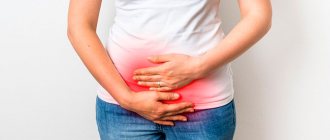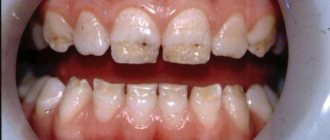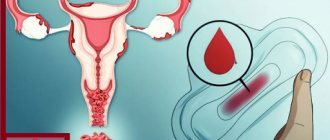Regular, on-time periods are a sign of a healthy reproductive system. However, in addition to the nature, consistency, and regularity, doctors pay attention to the volume of cyclic discharge. Thus, too painful, heavy periods often act as a symptom of pathology.
The severity of pain during menstruation
Pain during menstruation varies in intensity depending on the cause of its occurrence. The severity of the pain syndrome is determined by the accompanying symptoms:
- The first degree is characterized by mild pain during menstrual bleeding. In most cases, it has no systemic manifestations and practically does not affect daily activities. To cope with pain, women are recommended to take analgesics.
- The second degree has more pronounced painful symptoms, significantly reducing performance. To carry out professional activities as usual, a woman needs to take medications that have an analgesic or anti-inflammatory effect. In rare cases, pain is accompanied by systemic symptoms.
- The third degree is determined by the severe pain syndrome associated with algodismenorrhea, in which professional activity is practically impossible. This condition in a woman is accompanied by severe headaches, insomnia, nervous disorders, and loss of consciousness. It is very difficult to eliminate painful sensations even with the help of painkillers.
How do periods change after childbirth?
If a woman refuses breastfeeding, then after 2-2.5 months her periods will resume. When breastfeeding, periods do not appear until complementary foods are introduced. The nature of menstruation after childbirth changes in most cases.
Menstruation lasts less time, and the discharge becomes more intense. This is due to changes in the shape of the cervical canal. Many women note a decrease or complete disappearance of pain on the first day of menstruation.
The first postpartum menstruation is accompanied by heavy discharge, but this is considered normal and is not considered a pathology from a medical point of view.
What periods are considered heavy?
You can tell that heavy periods have begun by the volume of your discharge. You should be alert to the appearance of clots, changes in the consistency and color of menstrual blood. The following signs indicate the onset of heavy menstruation:
- Pads or tampons must be changed every 1.5-2 hours;
- the released blood does not have time to be absorbed into the hygiene products used;
- the need to change pads or tampons occurs even at night;
- bleeding continues for more than 7 days in a row.
If your periods are heavy, you need to monitor your general condition. If weakness or dizziness appears, it is advisable to consult a gynecologist; the patient may develop anemia due to significant blood loss.
For some women, very heavy periods are normal. There are cases when menstruation lasts more than 7 days; during the entire period of menstrual bleeding, more than 150 ml of blood leaves the body. At the same time, no pathologies from the reproductive or hormonal systems are detected during the examination.
In most cases, hyperpolymenoria is caused by various diseases. A comprehensive examination allows us to determine the reasons for the appearance of heavy periods, during which a large number of clots are released.
An increase in the volume of discharge during menstruation is provoked by an increased level of estrogen in the body. If the appearance of heavy periods with blood clots is not accompanied by severe pain or deterioration in general health, and a regular pad lasts for 2 hours, then there is no need to panic. After completion of menstruation, it is advisable to see a gynecologist and do an ultrasound.
The physiological reasons for the appearance of very heavy periods, in which clots come out, include:
- use of an intrauterine device;
- taking hormonal medications;
- taking pills that affect the functioning of the blood coagulation system;
- establishment of the menstrual cycle in adolescence;
- visiting a sauna, bathhouse, taking a hot bath in the first days of menstruation.
Important! You should not delay a visit to the gynecologist if the intensity of the discharge does not decrease after the 5th day of menstruation or if it does not completely end by the 8th day.
Women who have very heavy periods and large clots coming out of the genital tract should be examined. Heavy menstruation occurs advantageously in patients with the following pathologies:
- benign tumors in the uterus;
- malignant neoplasms;
- uterine polyps;
- hormonal imbalance caused by ovarian diseases;
- inflammatory diseases of the reproductive system;
- infectious lesions;
- endometriosis;
- endometrial hyperplasia;
- disruption of the blood coagulation system.
The appearance of very heavy periods with large clots is possible after trauma to the abdomen, genital tract, or during an ectopic pregnancy. An increase in the volume of menstrual flow may be due to complications that appear after abortions or miscarriages.
You can reduce the intensity of discharge if you follow these recommendations:
- avoid physical overexertion;
- do not lift heavy objects;
- refuse to visit steam rooms or take hot baths;
- Avoid drinking strong coffee.
Following these recommendations can reduce the likelihood that bleeding will increase. You can reduce discharge by placing an ice pack on the projection of the uterus. You need to keep it for 10-20 minutes.
To reduce the volume of discharge and reduce blood loss, you can use traditional methods of treatment or special hemostatic drugs. But it is advisable to take medications only as prescribed by a gynecologist.
Medical help is necessary if a woman’s bleeding intensity does not decrease by the 5th day of menstruation. Patients whose general condition is not impaired can go for a consultation with their gynecologist. The doctor must conduct an examination and prescribe treatment depending on the identified causes of the pathology.
Immediate help is required for women who:
- scarlet blood began to be released from the reproductive organs in large quantities;
- The pad fills completely in less than 2 hours;
- the skin has turned pale;
- weakness, dizziness, nausea appeared;
- cold sweat appears on the body;
- the temperature increased to 38 °C or more.
In these cases, you should call an ambulance. Immediate consultation is needed if menstruation has intensified or clots have appeared after an abdominal injury.
Urgent examination is required if heavy periods with clots begin after 45 years. Their appearance is possible due to hormonal imbalance during the premenopausal period. If women have already begun menopause and there is blood from the genital tract, this may indicate the growth of a malignant neoplasm.
Diagnostics
It is possible to establish the reason why heavy periods began and clots began to come out after an examination. In addition to a standard gynecological examination and smear, a colposcopy is performed, the doctor prescribes an ultrasound and tests for infections and hormones. If necessary, the woman is sent for hysteroscopy or therapeutic and diagnostic curettage.
Based on the results of the smear, inflammation can be detected and infection with infectious diseases can be suspected. During a colposcopy, the gynecologist examines the cervix under magnification. This makes it possible to identify erosive lesions, leukoplakia and other pathologies. Using ultrasound, you can see signs of endometriosis, polyps, endometrial hyperplasia in the uterus and other pathologies.
Hysteroscopy allows you to examine the uterine cavity from the inside and assess its condition. With the help of the procedure, it is possible to detect even minor changes in the endometrium, see polyps and take tissue for biopsy. When curettage is performed, the resulting tissue is sent for analysis to exclude the appearance of malignant cells.
For patients who come to gynecologists with complaints of too heavy periods with clots, the doctor may prescribe symptomatic therapy. Most often, doctors prescribe drug therapy. To normalize hormonal levels, hormonal medications are prescribed. Oral contraceptives are used for therapeutic purposes.
To reduce discharge, the doctor may recommend treatment with herbal remedies and traditional medicine methods. You can quickly reduce the intensity of discharge during heavy periods with the help of hemostatic medications.
For patients with heavy periods, before determining the cause of their occurrence, the gynecologist may prescribe hemostatic drugs. Sometimes due to heavy periods it is impossible to conduct an examination. Therefore, doctors prescribe:
- Tranexam;
- Vikasol;
- Dicynone;
- Etamsylate;
- Ascorutin.
If a woman’s condition is normal, but blood loss does not decrease, the doctor may prescribe a tincture of water pepper in order to increase blood clotting and reduce the inflammatory process. In cases where there is a risk of bleeding, drugs are prescribed that reduce the fragility of blood vessels, increase blood clotting, and act quickly.
Patients with heavy periods, during which large clots are released, are advised to reconsider their diet. A woman’s body should receive sufficient quantities of calcium, vitamins C and P with food.
Advice! If it is not possible to ensure the daily intake of vitamins and minerals from food, then it is advisable to take special multivitamin complexes.
You will have to exclude from the menu:
- alcohol;
- pickles;
- smoked meats;
- spicy foods;
- spices.
In the first half of the menstrual cycle, it is advisable to focus on complex carbohydrates; they should enter the body in an amount of 3-4 g per 1 kg of weight.
It is recommended to eat buckwheat, oatmeal, rice and other cereals, boiled potatoes, durum wheat pasta, and whole grain bread. After ovulation, the emphasis should be on protein foods.
They should enter the body in quantities of up to 1.5 g per 1 kg of weight. You can diversify your diet with seafood and offal.
It is recommended to include a variety of nuts in your menu. They contain B vitamins and polyunsaturated fatty acids. Under their influence, pain during menstruation is reduced and blood loss is reduced. Fish, green vegetables, and seeds have a positive effect on the condition.
Traditional medicine recipes can be used if a woman has heavy periods, clots come out, but her general condition remains satisfactory.
Nettle is most often used for medicinal purposes. A decoction of the leaves can be taken as a hemostatic agent. To prepare it, you need to boil 1 tbsp in a glass of boiling water. l. leaves 10 minutes. You should drink ½ glass three times a day. It is advisable to start taking the drug a week before the expected date of menstruation.
An infusion of horsetail is also considered useful. To prepare it, pour a spoonful of dry herbs into a glass of boiling water and let it brew for several hours. The strained infusion must be taken every 2 hours until the heaviness of menstruation decreases and large clots stop coming out. You can start drinking the infusion a few days before menstruation for preventive purposes.
Patients whose periods are too heavy should not delay visiting a gynecologist. With this condition, there is a risk of complications. Prolonged heavy periods can lead to anemia and poor overall health.
Lack of timely treatment of the underlying disease, which provokes the appearance of heavy periods with clots, can cause its progression. Over time, the condition will only worsen. If a woman misses the onset of bleeding, there is a risk of death.
To prevent the appearance of clots in menstrual blood or increase the intensity of discharge, gynecologists recommend:
- regularly undergo preventive gynecological examinations;
- give up bad habits that negatively affect the functioning of the blood coagulation system;
- exclude intense physical activity;
- review your diet;
- drink enough water daily.
Following the recommendations will help prevent heavy periods, the appearance of which is caused by physiological reasons.
Patients who have heavy periods with clots due to the appearance of tumors, polyps, infectious and inflammatory diseases will not be able to use preventive methods to reduce the intensity of the discharge and get rid of the clots. Treatment is required to normalize the condition.
Conclusion
Traditional Treatment for Heavy Menstruation
Ibuprofen
The traditional anti-inflammatory medication ibuprofen (Advil or Nurofen) reduces menstrual flow by half [4] . It works by reducing prostaglandins, which directly affect heavy periods. Take 200 mg every 6 hours on the first day or two of your period. Ibuprofen is a simple and practical solution for heavy periods. Yes, it's a pharmaceutical drug, but you only take it a couple of days a month. My opinion: this is much better than hormonal contraceptives.
Hormonal contraceptives
Oral contraceptives are the standard prescription for heavy periods, but for reasons discussed here , they are a bad solution.
Mirena, intrauterine device
Mirena is a better option than other hormonal contraceptives.
The IUD delivers a smaller dose of progestin than the pill, so it does not completely suppress ovulation. Plus, Mirena reduces the flow of periods by 90%, thereby offering significant relief from heavy periods. Unfortunately, once you remove the IUD, heavy bleeding will return. Of course, I hope that natural treatments work for you and that you don't need a hormonal IUD. But if you are driven into a dead end and forced to choose among traditional treatment, it is better to prefer the spiral to tablets.
Primary and secondary dysmenorrhea
Primary dysmenorrhea is most often diagnosed in adolescents, puberty girls and young women. The first menstrual bleeding in most girls aged 10-13 years is accompanied by sharp pain in the lower abdomen. If no painful symptoms were observed during menarche, they may appear over the next 3 years. Menstrual pain during this period varies in intensity.
Primary dysmenorrhea is called functional, since the causes of its occurrence are associated with changes in the tissues of the internal genital organs, and not with the development of organic diseases. Pain syndrome can occur a day before menstruation and persist for the first 2 days. Uterine pain of a cramping or aching nature often spreads to the ovaries, fallopian tubes and bladder.
Secondary dysmenorrhea is associated with congenital or acquired organic diseases that affect a woman’s menstrual cycle. Painful periods are a consequence of impaired circulation of the uterus, stretching of its walls, contraction of the muscle layer or other pathological processes.
Most often, young women aged 26-30 years suffer from secondary dysmenorrhea. Aching pain in the lower abdomen occurs several days before the start of menstruation. The maximum intensity of pain is achieved on the 2-3 day of menstruation.
In this case, the level of the hormones dopamine, adrenaline, and norepinephrine increases, causing a malfunction of the entire hormonal system of the body. Girls experience constipation, severe headaches, body temperature rises, heart rate increases, insomnia appears, legs and arms become bluish due to spasms of small vessels, the body and face turn pale.
It is characterized by an increase in the level of the hormone serotonin in the cerebrospinal fluid. In girls, on the contrary, the heart rate decreases, nausea with vomiting appears, body temperature decreases, gastrointestinal disorders are expressed by diarrhea, swelling of the limbs and face often appears, allergic reactions on the skin, girls gain weight.
Modern research establishes the fact that primary painful periods are not an independent disease, but a manifestation of deeper internal disorders, that is, symptoms of the following diseases or abnormalities:
- Congenital abnormalities of connective tissue development
In gynecological practice, it has long been established that approximately 60% of girls with primary algomenorrhea are diagnosed with genetically determined connective tissue dysplasia. In addition to painful periods, this disease is expressed by flat feet, scoliosis, myopia, varicose veins, and dysfunction of the gastrointestinal tract.
This is a very serious disease, which occurs more often in girls with elongated limbs, flexible joints, cartilaginous tissues; most often during the child’s growth, magnesium deficiency is detected, which can be determined by taking a biochemical blood test.
- Diseases of the nervous system, neurological disorders
In girls with signs of a reduced pain threshold, with emotional instability, with various psychoses, neuroses and other neurological disorders, the perception of pain is exacerbated, so pain during menstruation in such patients is pronounced.
- Bends of the uterus anteriorly and posteriorly, underdevelopment of the uterus, malformations of its development - bicornuate, two-cavity uterus
The occurrence of very painful periods due to abnormalities in the development of the uterus is caused by problematic, difficult outflow of blood during menstruation from the uterine cavity. This provokes additional uterine contractions, causing pain during menstruation.
If pain during menstruation occurs in a woman who already has children, or she is over 30 years old, then this is considered as secondary algomenorrhea. Today, it occurs in every third woman, most often in a moderate to severe form, since it reduces performance and is aggravated by accompanying symptoms, and is also accompanied by heavy menstruation. In addition to pain in the lower abdomen, painful periods occur with other symptoms, which are usually divided into several characteristic groups:
- Autonomic symptoms - bloating, vomiting, nausea, hiccups
- Vegetative-vascular symptoms - dizziness, numbness of arms, legs, fainting, rapid heartbeat, headaches during menstruation
- Psycho-emotional manifestations - disturbance of taste, perception of smells, increased irritability, anorexia, depression
- Endocrine-metabolic symptoms - increased unmotivated weakness, joint pain, itching of the skin, vomiting
The intensity of pain during menstruation depends on the general health of the woman, age and concomitant diseases. If the patient has a metabolic disorder (diabetes mellitus and other endocrine system disorders), then endocrine metabolic manifestations are added to the additional symptoms during menstruation; in case of disorders of the cardiovascular system, vegetative-vascular symptoms may be more pronounced; as premenopause approaches in women ( see the first signs of menopause), the likelihood of psycho-emotional instability and depressive symptoms increases.
Often women with secondary algomenorrhea experience pain during sexual intercourse, which clearly cannot be ignored and is an urgent reason to contact a gynecologist for examination and treatment. If primary painful periods, the causes of which are associated with congenital anomalies and pathologies, are very difficult to treat, then the occurrence of secondary algomenorrhea is mainly associated with acquired diseases of the female genital organs, the treatment of which must be carried out without fail, these are:
- infectious and inflammatory diseases of the female genital organs and the accompanying adhesive process in the pelvis
- malignant and benign (polyps) tumors of the uterus and appendages
- varicose veins in the abdominal cavity, in the pelvic organs
- endometriosis
- pelvic neuritis
Also, in women over 30 years of age, the appearance of very severe pain during menstruation can be caused by the following reasons, provoking factors:
- intrauterine contraception
- consequences of frequent medical abortions, other intrauterine interventions, due to scar narrowing of the cervix
- surgical operations on the uterine appendages, birth complications or complications after cesarean section
- mental and physical fatigue, constant stress, violation of rest and work schedules
Supplements and herbal remedies to prevent heavy discharge
| Product | Description | How it works? | Application |
| Iron | Iron is a critical nutrient for heavy periods. Iron bisglycinate with absorption cofactors works better than a single drug. | Iron corrects iron deficiency caused by large blood losses and can also alleviate them. This is why iron is both the cause and effect of heavy periods. [6]. | Ask your doctor to test your serum ferritin. If you are deficient*, take 15-50 mg of a mild, absorbable form called ferrous bisglycinate. The best food sources of iron are red meat and eggs. |
| Natural Factors, Theracurmin | Turmeric is a yellow spice often used in Indian cuisine. It contains the active ingredient curcumin . Turmeric and curcumin are both available in concentrated capsule form. | Turmeric reduces inflammation and prostaglandins, thereby decreasing menstrual flow in a manner similar to ibuprofen. Turmeric also lowers estrogen levels by blocking the aromatase enzyme. | Unlike ibuprofen (which should be taken only in the first two days of your period), curcumin should be taken every day throughout the entire cycle, one capsule and increase the dose to 2 pieces. per day during menstruation. It can also relieve stomach pain. Curcumin is safe and non-toxic even at high doses, take after meals. One caveat: may interact with anticoagulants. |
*Can't raise your iron levels? — The cause may be excessive consumption of dairy products. They inhibit iron absorption.
Checklist for heavy periods
- Rule out a medical cause, such as thyroid disease
- Consider taking ibuprofen on days 1-2 of your flow.
- Avoid cow bell products
- Consider taking iron and turmeric
- If you are over 40 years old, please read the post about excessive periods during perimenopause
PS Thank you very much to everyone who enters my code RAQ630 in every order on iHerb. This way you support the development of my blog! Everyone gets a 5% discount on any order!
Causes of heavy bleeding during menstruation
The method of treating pain syndrome is selected by the gynecologist after diagnostic measures. Self-medication can provoke the transition of the disease to a more severe form.
Therapy for dysmenorrhea will be effective only if an integrated approach is used when prescribing drugs. The treatment regimen for the pathological condition consists of the following types of medications:
- non-steroidal drugs that have an anti-inflammatory effect (Brufen, Ibufen, Nalgesin, Sanaprox);
- antispasmodics (Spazmol, Baralgin, Drotaverin, Spasmonet);
- hormonal contraceptives that contain gestagen (Duphaston, Levanova, Megastron);
- antifungal suppositories (Zalain, Betadine, Pimafucin) are prescribed for intensive proliferation of opportunistic microorganisms;
- medications that have a sedative effect on the central nervous system (Trioxazine, Valerian Forte, motherwort tincture);
- homeopathic medicines (Feminal, Onagris, Tazalok).
Timely administration of a set of physiotherapeutic procedures can significantly reduce pain during menstruation. Since physiotherapy has many contraindications, a gynecologist should prescribe procedures after determining the cause of the pain.
For primary dysmenorrhea, electrophoresis and acupuncture are used. Secondary pathology is treated using therapeutic baths, pulsed currents, electrical stimulation, magnetic therapy and ultrasound. It should be noted that physiotherapeutic procedures are contraindicated during menstruation. They should be carried out in the second half of the cycle.
ethnoscience
To reduce the intensity of menstrual pain, you can use traditional medicine methods. Horsetail has antiseptic and anti-inflammatory properties, therefore it is often used to eliminate gynecological diseases. A decoction of mint leaves, valerian root or chamomile flowers is often used as a pain reliever.
If during menstruation a woman has a volume of discharge coming out of the uterine cavity that exceeds the usual amount, then it is generally accepted that she is having heavy periods. This phenomenon is scientifically called “menorrhagia” or “hypermenorrhea”.
Many processes in the body can provoke such an anomaly, ranging from hormonal imbalance to cancer.
In some periods of a woman’s life, heavy bleeding during menstruation is not a pathology, but a normal variant.
In this article you will learn about the reasons why hypermenorrhea occurs, when such a condition is the norm, and when it is a sign of a disease, and what methods of treatment there are for this pathology.
The menstrual cycle for each individual woman is individual, but in accordance with medical standards, its duration should be within 21-35 days. Monthly discharge should last at least 3 days and no longer than a week. The normal volume of menstrual blood released during this period is 80 ml, but it can fluctuate between 50-150 ml.
If blood loss during the entire period of menstruation exceeds 150 ml, such regulation is considered abundant.
A woman cannot independently measure the volume of blood released during menstruation, therefore, to independently assess this parameter, it is customary to pay attention to the number of sanitary pads that the woman changed per day. Normally, there should be no more than 4 of them, but if there are more than 5, then heavy bleeding is diagnosed.
Heavy bleeding during menstruation is not a pathology in the following cases:
- with a genetic predisposition, in which abundant regulation appears in a woman in every cycle throughout her reproductive age, without additional uncomfortable symptoms or deterioration in the woman’s general condition;
- In a teenager during puberty, hormonal levels normalize for 1-2 years after the first menstruation. Abundant regulation in this case is a consequence of hormonal changes in the body, and they may well be replaced by scanty regulation or their prolonged delay;
- menstruation can be intense even during premenopause; at this time, the reproductive function of the ovaries begins to decline, as a result of which there may be various menstrual irregularities, including heavy or scanty blood loss.
The symptoms of hypermenorrhea caused by pathologies will primarily depend on the type of disease.
It is necessary to pay attention to the color and consistency of the regula, and not just their quantity. The pathological symptom is bright scarlet discharge with large clots, as well as the need to change hygiene products more often than every hour and a half.
There are several other symptoms of abnormal menstruation:
- intense pain in the lower abdomen;
- general weakness, dizziness, headache, bruising all over the body for no reason, frequent nosebleeds, bleeding gums, the woman often faints;
- during inflammatory processes in the uterus, against the background of heavy blood loss, body temperature rises.
If you have at least one of the listed symptoms, then heavy menstruation is caused by pathology, and you should consult a gynecologist.
It should be remembered that there are two types of menorrhagia: primary, which occurs with the first menstruation in adolescence, and secondary or acquired, it can appear at any age, but provided that before that the woman had normal menstrual flow.
Let's look at the most common causes of very heavy periods:
- hormonal imbalance. If the menstrual cycle proceeds normally, then under the influence of estrogen and progesterone, the endometrium is rejected in the uterus. If the hormonal background changes, the endometrium can grow rapidly, which is why during menstruation the discharge begins to be too abundant. Such hormonal surges are typical for girls at puberty, when the cycle is just establishing, and for women on the eve of menopause, when ovarian functions begin to fade;
- malfunction of the ovaries. When there is no ovulatory phase in the menstrual cycle, insufficient progesterone is produced. Such hormonal disorders cause severe menstrual and uterine bleeding;
- benign tumor in the uterus (fibroids). This type of neoplasm is typical for women of reproductive age. One of the signs of fibroids is heavy menstruation;
- polyps in the uterus. This benign focal growth of the endometrium occurs in women from 25 to 40 years of age during periods of high hormonal activity. With polyps, a lot of blood is released during regulation;
- adenomyosis. This is a pathology in which cells of the inner mucous layer of the uterus grow in its walls. A characteristic sign of the disease is painful regula, which occurs too intensely and can develop into uterine bleeding;
- intrauterine device. Many women who install this method of contraception for the first time note that during menstruation the discharge has become more abundant. This condition is allowed during the first three months after installation, when the body gets used to the IUD, but if heavy regulation occurs in the 4th month or turns into uterine bleeding, the IUD must be urgently removed;
- ectopic fetal development. Heavy blood loss during menstruation can be caused by implantation of a fertilized egg in the fallopian tube;
- malignant tumors. In the initial stages, cancerous tumors may not manifest themselves in any way; in later periods, very intense bleeding may occur during regulation, with pain and discomfort in the lower abdomen;
- With problematic blood clotting, abnormal uterine bleeding often occurs. One example of such diseases is hereditary von Willebrand pathology;
- taking certain medications. Some anticoagulants or anti-inflammatory medications may cause increased menstrual flow;
- infections and inflammatory processes in the reproductive organs;
- stressful conditions, psycho-emotional disorders;
- excessive physical activity associated not only with sports, but also with work;
- exhausting diets, fasting, vitamin deficiency.
Only a gynecologist can accurately determine the causes and factors that provoke heavy discharge during menstruation after carrying out a series of diagnostic measures, so do not self-medicate, so as not to harm your health, but immediately seek medical help.
The treatment method for heavy periods will depend on the cause that caused them. The course is prescribed individually and may include both medications and folk remedies. In some cases, lifestyle changes may be sufficient to correct the cycle, and for certain diseases, surgery may be necessary.
Medicines
To make periods less heavy, the doctor first prescribes hemostatic drugs. The choice of a specific medicine depends on the factor that provoked the increased discharge. Most often, drug therapy includes the following medications:
- Ascorutin. This is a vitamin preparation, its action is aimed at strengthening the walls of blood vessels. Ascorutin produces a cumulative effect; it can stop heavy blood loss only if taken regularly for at least 3 weeks, so the drug is more often recommended for the prevention of uterine bleeding and after surgical intrauterine interventions. An analogue of the drug – Rutascorbin;
- Vikasol. The drug is a source of vitamin K, the main component for the protein that regulates blood clotting processes. It is prescribed if, after diagnosis, it is determined that the cause of abundant regulation lies in a deficiency of vitamin K in the body;
- Dicynone. Analogue Etamzilat. These are hemostatic tablets that promote rapid blood clotting, but do not constrict blood vessels and do not provoke the formation of blood clots. The drug can be used for heavy bleeding and intense menstruation, but it is contraindicated in pregnant women and nursing mothers. The effect of the drug in patients with thrombocytopenia may be absent. If the situation is severe, they begin to inject the drug intravenously, after relief of the condition they switch to intramuscular injections, and then to the tablet form;
- Tranexam. The tablets help stop the intense regulation that is caused by the activation of fibrinolysis (the process during which the clot that forms at the site of a bleeding vessel dissolves). Tranexam additionally has an analgesic, anti-inflammatory, anti-allergenic and anti-infective effect. A side effect is the formation of blood clots, so the drug is not prescribed if there is a history of thrombosis or if there are problems with blood clotting.
Diet and lifestyle to prevent heavy periods
Natural therapy aims to prevent heavy periods. They cannot stop periods that have already begun.
Avoid dairy products made from cow's milk
My clinical observation: dairy products increase menstruation. This is consistent with a recent study that found that dairy products may substitute hormones and negatively affect ovulation [5] . Eliminating dairy products is a safe and easy solution. Try this diet for a few months. But remember that you can eat dairy products or goat and sheep milk. A dairy-free diet may be effective for teenagers.
Keep your insulin levels low
Insulin is a growth hormone that thickens the endometrium. Excess insulin can weaken ovulation and cause progesterone deficiency. You are more at risk of having heavy bleeding if you are insulin resistant and have an insulin-resistant type of PCOS .
Exercise
Exercise improves insulin sensitivity, reduces inflammation, and promotes healthy estrogen excretion through sweat.
Maintain healthy intestinal flora
Healthy intestinal flora promotes the safe elimination of estrogen from the body. Unhealthy flora does the opposite. It interferes with estrogen metabolism and leads to its reabsorption. One of the best methods for maintaining healthy gut flora is to avoid antibiotics that damage it as much as possible.
Eat phytoestrogens
Phytoestrogens are found in edible plants: nuts, legumes and flaxseed. They reduce the effects of estrogen by blocking estrogen receptors and promoting healthy metabolism of the hormone.
Heavy discharge during menstruation
Despite the fact that the amount of blood released is an individual characteristic of each woman, menstruation that does not stop throughout the week, during which it is very often necessary to change hygiene products, is considered heavy. A large volume of menstrual flow (menorrhagia) can be a sign of serious disorders in the functioning of the female reproductive system.
Possible reasons
The main causes of heavy discharge during menstruation are the following pathologies:
- hormonal disbalance;
- infections of female genital organs;
- disorders caused by the intrauterine device;
- decreased blood clotting;
- diseases of the endocrine, genitourinary or cardiovascular systems;
- overload of the body caused by stress or physical activity.
Causes due to uterine pathology
The main reason why periods are heavy is considered to be pathological conditions of the uterus. During menstrual periods, blood is released due to contractions of this organ. In a healthy state, they are rhythmic and intense, so the number of menstruation is normal.
The diseased uterus contracts weakly, the muscles cannot hold the discharge, so the woman experiences heavy periods, or, as they are commonly called in medicine, menorrhagia. Common uterine pathologies that affect the amount of discharge include:
- benign or malignant neoplasms – fibroids, polyps;
- inflammatory processes;
- adenomyosis;
- diseases of the cervix.
Menstruation, which is accompanied by heavy loss of blood, can be associated with pregnancy and appears in the following cases:
- While carrying a child. It is not uncommon, but it is not considered the norm, because it is often a symptom of a miscarriage.
- During an ectopic pregnancy, when the embryo ruptures the fallopian tube.
- As a result of surgical abortion.
- Menstruation after childbirth. The first periods may be heavy, especially if before pregnancy the menstrual flow was very heavy due to the individual characteristics of the woman or the birth was complicated.
If menstruation is characterized by a large amount of blood loss, then it may be a symptom of cervical diseases such as:
- Polyps are neoplasms that are easily injured and bleed, thereby increasing the amount of discharge.
- Cancerous tumors provoke the release of large amounts of estrogen, which affects the amount of blood. Its color is bright, often scarlet.
- Endometriosis is an abnormal growth of mucous tissue that peels off and comes out as secretions, increasing the volume of blood.
- Cervical erosion is a covering of the mucous membrane of the cervix with ulcers that can bleed.
Very heavy menstruation can occur due to pathologies of the uterine body. The most common are:
- Uterine fibroids are benign tumors that appear in women of childbearing age.
- Adenomyosis is an abnormal growth of the endometrium (internal mucous tissue of the uterus) and its ingrowth into the muscle tissue of the organ. Most often occurs in women who have given birth in their 30s and 40s. This endometrial dysfunction causes very heavy menstrual bleeding. It develops against the background of hormonal imbalances, but the etiology of the disease has not yet been fully investigated.
- Endometritis is an inflammatory process in the lining of the uterus; the most important symptom is menstrual irregularity, in particular the fact that blood is released more intensely.
- Polyps - increase bleeding according to the same principle as formations in the cervix.
- Malignant tumors.
If a combination of diseases is observed, the unpleasant symptoms intensify. For example, mimoma and adenomyosis are quite common in practice and require close medical attention.
Heavy menstruation can be caused by reasons not related to diseases of the uterus and appendages. Most pathologies that provoke menorrhagia develop against the background of hormonal imbalance. But sometimes heavy periods occur due to disturbances in the functioning of the circulatory, endocrine systems and in some other cases.
If a woman has genetic or acquired problems with blood clotting, then the cycle is characterized by certain features:
- heavy periods are observed due to the fact that the blood does not have time to clot;
- Menstruation is longer and can last 7–10 days.
The causes of this pathological condition are most often the use of medications and a deficiency of essential microelements.
Iatrogenic causes
Iatrogenic causes of disease include the actions and statements of medical professionals. Among them there are those that make your periods heavy. This may be the success or failure of surgical therapy, the effect of medications on the body, or the use of certain contraceptives.
Excessive periods may be the result of surgical interventions. The most common:
- abortive termination of pregnancy;
- curettage of remains after miscarriages;
- C-section;
- damage to the uterus during childbirth and its correction.
If your periods are very heavy, you need to pay attention to medications you have recently taken. According to the observations of experts, this reaction is most often caused by:
- anti-inflammatory drugs;
- anticoagulants;
- antiplatelet agents;
- contraceptive drugs;
- hormone analogues.
Very heavy periods can occur after the installation of a contraceptive device such as an intrauterine device. In this case, the discharge must be strictly controlled by a specialist.
Diagnostic methods
If a woman complains of heavy periods, then first of all the doctor collects a detailed history and analyzes it. The patient must tell in detail what medications she is taking, whether she has had childbirth or pregnancy, and also describe her general condition - this also affects the diagnosis. After this, an examination of the internal and external genital organs is carried out, this allows you to determine whether there are any pathologies. During the examination, the specialist also excludes or confirms the possibility of pregnancy, in particular ectopic, and consider the presence or absence of fibroids.
If necessary, the patient can undergo an ultrasound, a biopsy, a cytological smear test and a general blood test. Also, after consultation, many are recommended to keep a calendar, noting in it not only the days of menstruation, but also its characteristics. If necessary, additional examination may be prescribed.









